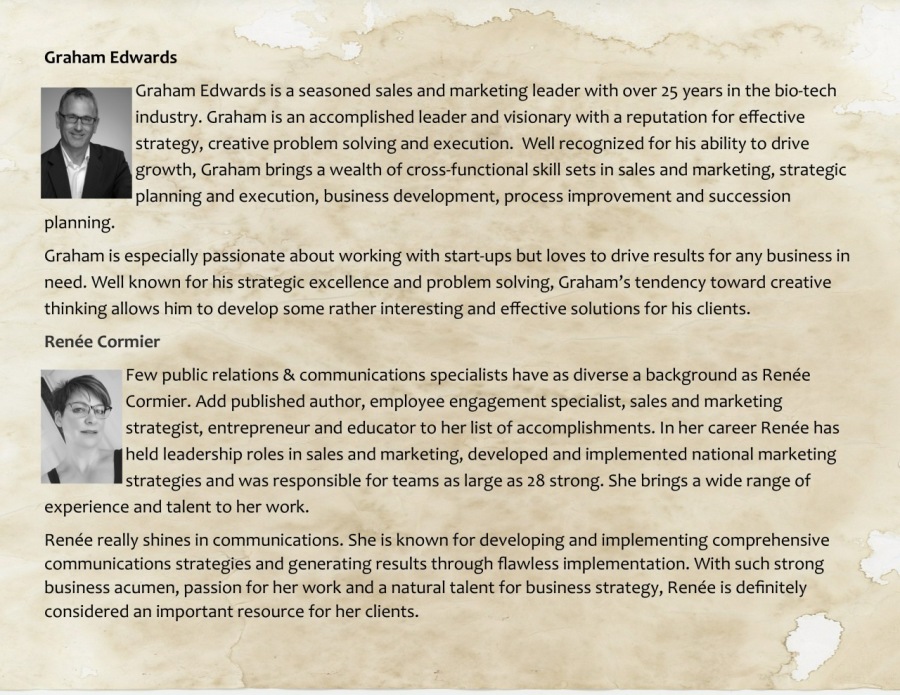Questions to Help You Mind Your Business... Question #7
This is the seventh in a series of thoughts and opinions by Graham Edwards and Renée Cormier — click here to read the backstory and inspiration (if only for the entertainment). It should be noted that neither of us have seen or discussed our answers before they are posted, which in our mind makes this all the more interesting.

In this blog series we will attempt to answer ten different questions business owners may need answered, using our individual and unique perspectives and approaches. It is our hope that this series will inspire both action and interaction. Please feel free to comment and ask more questions.
Graham —
I have been both an individual contributor and have managed teams though out my career, and when I say I really enjoy managing people and developing teams I’m dead serious. I will also say my most rewarding (and prolific) period in this regard started about ten years ago as the Millennials were entering the work force — we all learned so much.
The answer to this question will consist of three parts, and if “we are all lucky” it will tie together nicely at the end, and if not… well… it wasn’t for a lack of trying.
Part One — The Millennial
Why do I start here? It’s because I have first-hand experience managing and leading this generation, and because there’s a very large number of Millennials in the work force — they most definitely will be a big part of your team (directly or indirectly).
The Millennials are a popular demographic to be sure, and it seems that there are articles daily on their numbers, how they will soon eclipse the Gen Xers, and how they are tricky for current managers to… well… manage them. What is interesting with all of this commentary is that it has become a “generational discussion” instead of a discussion about how to build teams and manage the most important resource any business has to stay relevant. I suppose with all this commentary and insight the levers to manage this generation are different than previous generations, and god forgive that management may have to adapt.
My intention here is not to profile the demographic but rather offer some points of consideration from the perspective of hiring and ultimately building a team.
Collaboration: Millennials are very collaborative regarding how they work, how they want to work, and the environment they want to work in — this may in fact be the most important consideration when developing and leading a team. I always found it fascinating when having a meeting there was always someone who would say something and make a point of speaking for the team rather than themselves. (Well, it was for themselves but was artfully couched in the safety of the team)
Recognition and Reward: Millennials hold a high need for recognition and reward; this is a component of that overall perception that Millennials are entitled and have a belief system that they are very, very special.
Impatient: Whatever the reason (be it the quick response from Google, their friend’s quick response on Instagram when they are bored, or that their parents gave them candy when they cried), Millennials are quick to become disheartened or bored if they don’t get what they believe they should be getting in a timely fashion (see above). This is very much reflected in the growing nomadic nature of Millennials as they move from job to job or entry-level sales professionals believing they should be the VP of Sales after six months.
Bravado: Millennials show really, really well. They may know all this technology you don’t, they will say they know how to do it (and they truly believe it), are confident and articulate, and (I’m paraphrasing here) are the “best generation ever” — that’s what they say (and so do their parents). I’ve seen more than one leader hire on this “bravado” and then be surprised (and slightly disappointed) when the person has to start at the beginning (like the rest of us).
Are Millennials a high potential generation? Yes, they sure are. Do they get a special “bye” when navigating free enterprise, macro and micro economics, as well as the world at large? Of course they don’t. We are all very similar in this regard.
Part Two — Hiring (and Development)
It’s a rarity that you get to build a team from scratch and most likely will hire into your existing team when expansion or vacancies occur. Whatever the reason for hiring though, I believe that by definition a team is supposed to be a dynamic creature, forever evolving and forever developed.
Good people get promoted and others developed up or out of the organization. No one is served by having a static team.
Hiring should be a “regular enough” occurrence and recognized as important enough to have a process in place — 1) goals, objectives and expectations of the team, 2) job descriptions and required competencies, 3) a hiring process, 4) a hiring team in place, and 5) an understanding of the strengths and weaknesses of your current team. All of this will just make the process go smoother and frankly ensure you hire the best person possible. Click herefor a blog I recently wrote on hiring.
Development is a close cousin to hiring and very much an aspect of building and growing the team. Development also offers an understanding regarding the type of person you may need to hire into your team that will complement the current skill set of the team and its maturity. When I hire I always consider three things — does the person have the competencies (or able to develop the competencies) to take on the role, is the person promotable with time, and will the person make the team stronger.
Part Three — Building a team
The following are some key considerations when building a team — with a golden rule that they apply to everyone. There are no exceptions that fall outside of the team and how it operates (it does not matter how “super” the superstar is, they don’t get an exemption).
Clear objectives and expectations: It is important to have (and clearly communicate) objectives and expectations as they apply at the team and at the individual level, and be consistent with them over time. Since team objectives are a consideration of “You, Me and Us”, it is important to be collaborative in review and development. And as with all objectives (and expectations) three to five are enough.
Operating mechanisms: This refers to the meetings and activities that are used to operate, manage, and develop the team:
- Individual 1:1 meetings
- Team meetings
- Performance reviews
- Development reviews
- Team building events
- Cross functional meetings
This is not to suggest that you bog yourself down with meetings (because as you know work needs to get done), but you do need to ensure that the team is operating effectively and efficiently.
Transparent communication: Be as communicative as possible. Teams perform better when they are in the know, be it good, bad, or indifferent. A dialogue will always develop a better perspective, solution and result.
Diversity: A team is the sum of its individuals (and more), and it is important to create as much diversity as possible — gender, experience, skillsets, tenure, et cetera. This will offer different perspectives to your discussions, support training and mentorship, and help you manage though times of transition (when people leave for various reasons). And if you really want to better understand the diversity and hidden strengths of your team, I recommend you profile everyone (including yourself). I’m familiar with both Meyers-Briggs and DiSC, and they helped me better understand myself, my teammates, and encouraged better communication and common ground for understanding.
Reward and recognition: Celebrate success! Learn from mistakes! Both are important. With that said, unlike grade school everyone doesn’t get a medal for participating so it is important to define what will be celebrated and reinforce what success is whenever you can. And then celebrate it (BIG).
Leadership: Teams are an incredible opportunity for everyone to be a leader and contribute to the success of the team, but remembered there can only be one “owner” of the team — one person who will answer for the success of the team or it’s failure. The success or failure of the team you build is a reflection of you! It is one of the coldest of realities when considering “How do I build a team?”
And with all of this said, probably the most important piece of insight I can offer is to take building a team very, very seriously — because doing it right is not that easy.
iamgpe
*****
Renée —
It is interesting that question seven is about team building. I consider that there are seven essential rules for creating an effective team. Check them out below and let me know what you think.
Rule number one for assembling a team is to hire good people and exclude all others.
Teams are all about the people who are on them, so if I had to advise anyone regarding their initial approach to building a team, then I would advise them to get rid of people who don’t have the right attitude. Anyone who is self-serving, negative, unreliable or untrustworthy should be eliminated from the start. These people are toxic and will interfere with your success.
“You're only as good as the people you hire.”
Ray Kroc
Rule number two is to make sure your team is composed of people with diverse skills and backgrounds.
The best teams are made of people with diverse backgrounds, talents and skills. Consider, race, gender, ethnicity, professional expertise and personality type when assembling your team. There are many assessment tools that allow you to determine a person’s suitability to various tasks and their compatibility with other team members. Truity offers free online Meyers Briggs tests and has good descriptions of each type and how they interact with others. It is important to have just the right amount of push and pull between people.
Rule number three is to ensure each team member has respect for each member’s level of expertise.
Nothing will ever go smoothly in a group where there is no respect between all members. You don’t need 100 per cent agreement all the time, but you do need to respect the opinions if other group members and their level of expertise. Respect and trust go together. You cannot have one without the other and no team will function optimally without both.
Rule number four is to establish trust between members.
Every team member needs to be able to establish a trusting relationship with each member. Building trust between people is something that takes time, but if you have already assembled a group of good people who share similar values, then you will have fewer hurdles to overcome. Team members need to be able to trust the work quality of their team mates, trust their ability to stick to deadlines, trust their opinions and trust that they will not do anything to undermine the team’s success.
Rule number five is to establish a set of values to guide decisions and all other work.
I feel that it is important to establish a set of values that each group member adhere to as they work on projects and make decisions. It is enormously helpful if the values that are established are values that each individual genuinely appreciates and adheres to in everyday life. I say this because my feeling about values is that you either have them or you don’t. They can’t be shut off or turned on at any given moment. For example, it is easier to embrace the value of integrity and doing the “right thing” if your natural inclination is to be that way. If your moral compass wavers in your private life, however, then you will have no problem doing the wrong thing whenever it suits you.
Rule number six is to establish and work toward a shared vision.
Teams need vision as much as they need values. Knowing what the big picture is allows the team to move beyond being a group of people who complete tasks. People who share a common vision are able to think more creatively and be flexible with their ideas.
Rule number seven is to establish strong leadership.
In a group, the person who really wants to lead and take over, should not be the leader. These people stifle creativity and create resentment. Every workplace seems to have a martyr who takes on all the work of the others, controls all the processes, works tirelessly without breaks and gives no opportunity to others to shine or contribute in any meaningful way. These people are terrible leaders but will volunteer for everything. A strong leader recognizes the strengths of others, sees that work is evenly distributed and that people are working in harmony. The best leaders delegate fairly, elicit input from others, make decisions, have everyone’s back and have no personal agenda.
There is a lot more to making a team work smoothly than what I mention in this post, but you will be off to a strong start if you are able to gather the right group of people from the start. I have always been an advocate of not keeping negative influencers in your company. It may not be practical for you to fire all the negative people from your organization. Ultimately, your ability or inability to attract and retain good people is a reflection of your own leadership. You may have to start with fixing yourself, first.
“Teamwork makes the dream work, but a vision becomes a nightmare when the leader has a big dream and a bad team.”
John C Maxwell
Thanks to the social media platform beBee, Renée Cormier & Graham Edwards developed a business relationship and friendship that typically involves regular meetings, goal setting sessions, etc. Our meetings often provide the fuel for plans around business strategy, blog ideas and more.

""
Articles from Graham🐝 Edwards
View blog
Before I take you on a metaphorical journey, I wanted to mention two very important truisms that I w ...

Decades of sitting behind desks, in airplanes or in a car has blessed me with very tight hips which, ...

Social media feeds are filled with the anticipation of a new year and all the best wishes that come ...
You may be interested in these jobs
-

Aide Serveur
Found in: beBee S2 CA - 5 days ago
La Cage Laval, Canada Part timeDescription · On va aller droit au but : on te veut dans l'équipe. · Joins-toi à nous pour faire vivre l'ambiance Cage à nos invités et promouvoir le plaisir en travaillant On t'offre :Salaire compétitif · Horaire adapté à ton rythme de vie · Programme de référencement payant · ...
-
assistant cook
Found in: Talent CA 2 C2 - 2 days ago
Biryanis and More Toronto, CanadaEducation: · Expérience: · Education · No degree, certificate or diploma · Work setting · Restaurant · Tasks · Prepare and cook complete meals or individual dishes and foods · Plan menus, determine size of food portions, estimate food requirements and costs, and monitor and ord ...
-

Ingénieur(e) chargé(e) de projets, procédés
Found in: Talent CA C2 - 6 days ago
Tetra Tech Alma, CanadaPour Tetra Tec h, c'est l'humain d'abord et avant tout. Nous avons la conviction que nos gens sont notre force et c'est pourquoi nous en faisons notre priorité. · Tetra Tech c'est employés aux quatre coins du monde, c'est 4 milliards $ de chiffre d'affaires, et plus de projets d ...

Comments